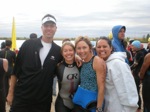By Allison Westfahl, exercise physiologist, author, and coach.
*FREE Webinar: “Nutrition & Training for the Gluten-Free Athlete” – June 29 at 1 p.m. ET. Register now
»
1. Experiment with new gels, bars, and drinks during your training sessions, NOT during the race.
We’ve all done it. You forgot to pin your Hammer gels to the inside of your running shorts, so you decide to just grab a different gel being handed out at Mile 16. Then Mile 18 hits and you can be found running even faster….towards the port-o-potty. Find out which products work for you and do not deviate from those products during the race.
2. Don’t change your diet the day before the race.
Contrary to popular belief, eating 3 servings of gluten-free pasta the night before a race won’t make you faster- it will only bog down your digestion and increase your trips to the bathroom. Stick with what your body knows and likes.
3. Eat a small, carbohydrate-rich breakfast two hours before the race begins.
If you’re a cyclist, you can get away with a few more calories before the race begins. However, if you’re doing an impact-based event (i.e. running) then you’ll want to eat a little lighter so that you don’t cramp up at mile 2.
4. Try to take in approximately 150-200 calories per hour during the race.
I can’t tell you how many times I’ve had clients tell me they bonked at mile 10 in a half marathon, then admit they didn’t eat anything the whole race because they “weren’t hungry.” That bonk could have been prevented if your body was fueled correctly. Remember that during a race, you are eating for fuel, not necessarily for hunger.
5. Try to drink 16-32 ounces of water per hour of exercise (events lasting over one hour)
Studies have definitively shown that heart rate, body temperature, and rate of perceived exertion all increase as hydration levels decrease.
6. After the race, take in moderate amounts of complex carbohydrates, lean protein, and unsaturated fat.
Your body uses carbohydrates almost exclusively during events (especially distance races), but afterwards you will want to give your muscles some amino acids (via protein) and unsaturated fat to help with tissue repair and muscle recovery.
And finally, don’t forget to check all your race-day products to confirm they are gluten-free. Here is a very brief list of some common products that fit the bill:
Gluten-free sports gels and drinks:

Allison Westfahl is an exercise physiologist, author, and coach in Boulder, CO. She has been gluten-free for 6 years, and just released her first book,
The Gluten Free Fat Loss Plan. Her website is www.allisonwestfahl.com
Opt-in to stay up-to-date on the latest news.
Yes, I want to advance research No, I'd prefer not to